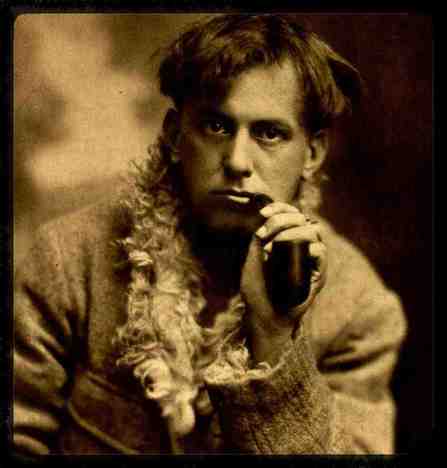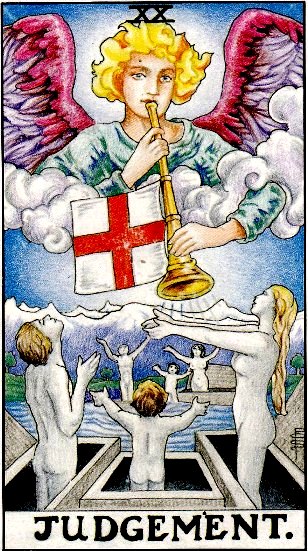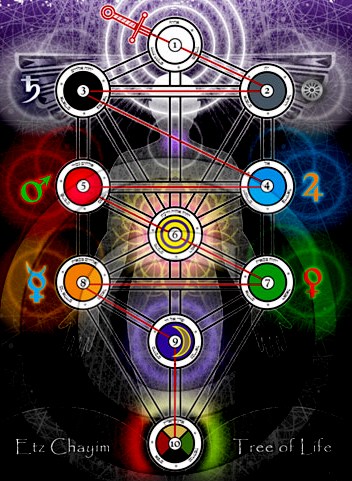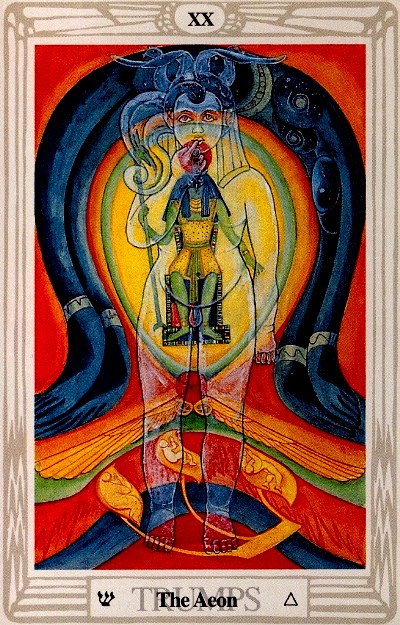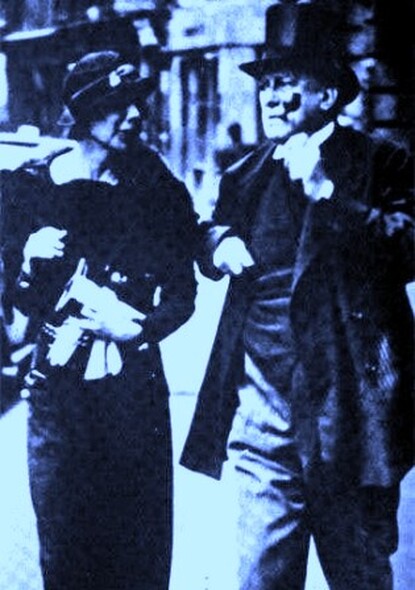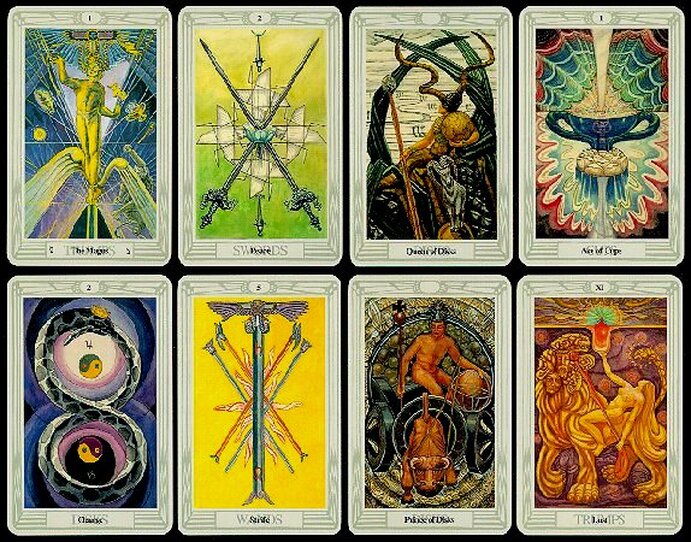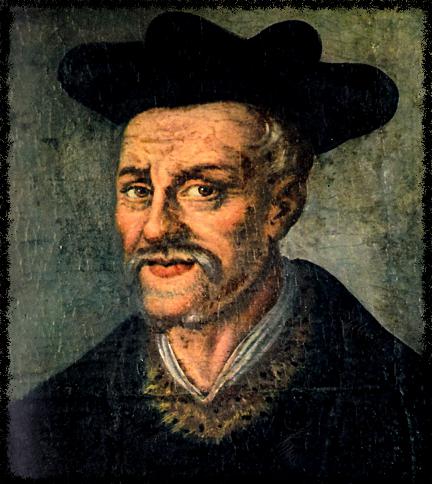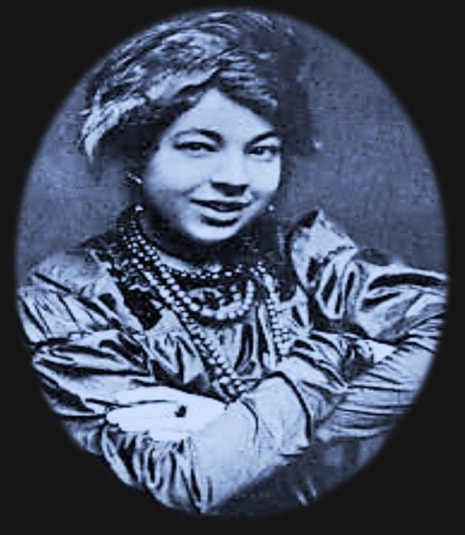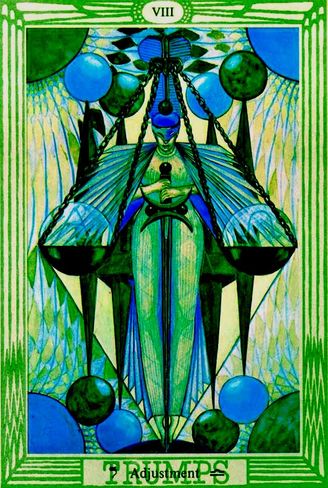Aleister Crowley
(& the Aeon of Horus)
.
by Michael Tsarion
|
I have been accused of being a ‘black magician.’ No more foolish statement was ever made about me. I despise the thing to such an extent that I can hardly believe in the existence of people so debased and idiotic as to practice it - Aleister Crowley (The Sunday Dispatch, 1933)
|
|
|
|
The twentieth card of the Tarot’s Major Arcana - Judgment or The Aeon - corresponds with Aries, the sign which opens the solar zodiac. Astrologically, Aries is associated with new birth and masculine creative energy. The planet-archetypes assigned to The Aeon are the Sun and Pluto. In astrological parlance the card’s meaning is analogous to Pluto in Aries or a conjunction between Mars, Sun and Pluto. Conventionally, Pluto is associated with the sign of Scorpio. However, psychologically it connotes the "Shadow" and corresponds with gods such as Thanatos, Hades and Shiva. It is associated with the so-called underworld journey and spiritual resurrection.
Historically, the discovery of the planet Pluto coincided with major upheavals and new paradigms of thought and communication. After its discovery, in 1930, the atom was split, the Great Depression occurred in America, Adolf Hitler rose to power in Europe, and World War II broke out. The planet-archetype certainly represents painful catharsis and difficult psychological transformation; new life emerging from the ashes of the old and outworn. In the Rider-Waite deck we see three naked figures rising from graves with arms outstretched in the shape of Latin word Lux, meaning “light.” Above them is Archangel Gabriel with his trumpet. |
|
The Rider-Waite version
|
|
The design intentionally represents the supernal triangle on the Kabalistic Tree of Life, that is, the three highest Sephiroth known as Kether, Chokmah and Binah.
|
|
|
|
The youth in the center represents the sphere of Tiphareth, esoterically associated with Horus. Although Horus is traditionally considered a solar deity, he is - in his aspect of avenger - closely associated with Pluto. He was the rival and conqueror of Set, his father's evil brother and arch-enemy. He is the prototype for mythological avengers Hercules, St. George, St. Michael, and so on.
The Aeon’s imagery also relates to the precessional movement of the sun, moon and planets through the zodiac. This cycle of 25,920 years is referred to as the Great or Platonic Year. The Aeon pictorializes an important mythographic event in the celestial revolution - the resurrection of sun god Ra-Hoor-Khuit, Harpocrates or Horus the Younger. In the Gnostic tradition Horus is Io (pronounced Aho). In the Thoth deck we see him with forefinger pressed to his lips. This pose indicates the Hermetic mysteries of which he is keeper. The letters I and O connote the Phi ratio or geometric harmony of the universe. |
|
Crowley's Thoth Tarot version
|
|
The esoteric letter of The Aeon is shin (pronounced shayeen), closely related to the English word shine. Although the previous card depicts the physical sun, The Aeon connotes the heart or spirit of the phenomenal sun which, though not visible to the senses, is discerned once subtle modes of insight and understanding awaken. The Aeon represents the unseen light or power behind the world of matter. It represents the energy behind perceivable, quantifiable bioenergy; the numinous Implicate or enfolded power emanating from the center of every atom, cell, corpuscle, emotion and idea.
|
|
|
Dr. George W. Crile, of the Cleveland Laboratories...announced that he had discovered at the heart of every living organism a tiny nucleus of energy, all aglow, with temperatures ranging from 3000 to 6000 degrees of heat, which he called "radiogens" or "hot points" precisely akin to the radiant energy of solar matter. He affirmed that a tiny particle of the sun's power and radiance was lodged within the heart of every organic unit! - Alvin Boyd Kuhn (The Great Myth of the Sun Gods)
...our individual consciousnesses could be derived from a higher...consciousness through an interface created in the brain by endogenous light. It is hypothesized that photons emitted from cells in the brain are guided to the surfaces of the brain's fluid-filled ventricular spaces, where they interact with cilia lining those ventricles and are guided by the timed beating of the cilia so that the photons form interference patterns within the ventricular spaces, creating an interface through which a tiny portion of the "light of God" is able to animate the corpus. Some of the necessary mechanisms such as light emissions from cells are known; others are hypothetical - Karl Simanonok PhD (The Divine Light of Consciousness) |
|
|
|
The "light" seen emanating from the card represents the spiritual intelligence or Universal Order which is negentropic in nature and not created by human beings. Indeed, humans are themselves emanations and embodiments of this Order or Logos. Coming into conscious attunement with the Logos constitutes a truly holy act, and is the goal of the Magnum Opus or Great Work. Arriving at this state of attunement requires mental, emotional and physical purification. It entails a quietening of the chatter of the Left Brain (ego-consciousness).
To emphasize the idiosyncratic qualities of Arcanum 20, occultist Aleister Crowley, of the Hermetic Order of the Golden Dawn and Ordo Templi Orientis, decided to change its imagery and title. To comprehend why his changes are significant and why he wanted the Arcanum to stand out, we have to know something about his life, times, circle and occult ideas. |
|
.
No matter to what depth I plumb, I always end with my wings beating steadily toward the sun - AC |
|
|
Edward Alexander Aleister Crowley was born under the sign of Libra on October 12 1875, the year the Theosophical Society was founded. Born to a family of fundamentalist Plymouth Brethren, he attended Cambridge University and read his first "occult" tract The Cloud Upon the Sanctuary by Karl von Eckharthausen at age twenty two. On November 18 1898, he was initiated into Hermetic Order of the Golden Dawn, an occult fraternity founded in England by Dr. Wynn Westcott, William Robert Woodman and Samuel Liddell (also known as MacGregor Mathers). The Order’s members included A. E. Waite, Dion Fortune, Arthur Conan Doyle and W. B. Yeats. Crowley studied Tarot and Hermeticism assiduously under Mathers and mystic Alan Bennett. After studying Book T by Mathers, he realized he had a destiny with the Tarot or Grimoire of Thoth.
Both Mathers and Crowley knew that prior to the advent of their Hermetic Order, Tarot interpretation and usage were exoteric and mundane. Mathers was perplexed that he was chosen to restore the esoteric secrets of the seventy eight Arcana. With characteristic hubris he wrote of the matter: |
|
|
Do you imagine that where such men as Court de Gebelin, Etteila, Christian and Levi failed in their endeavor to discover the Tarot attributions that I would be able of my own power and intelligence alone to lift the veil which has baffled them?
|
|
|
|
Crowley clearly knew the time had come for a restoration of Tarot, the authentic “Emerald Tablets of Hermes” or “Book of Life.” He wrote that he had:
|
|
|
...deplored the absence of any authentic Text on Tarot. The medieval packs are hopelessly corrupt or otherwise far from presenting the Ancient Truth of the Book in a coherent system or shape of lucid beauty - (Preface: The Book of Thoth)
|
|
|
|
The result of his education during his time with the Golden Dawn was his Thoth Deck. The cards were painted by Golden Dawn member and Freemason Lady Frieda Harris. She worked with Crowley to formulate their deck’s appearance and occult properties. Through her persuasion, Crowley invested five years of concentrated work honing his esoteric knowledge of magic, divination and symbolism.
|
|
|
She devoted her genius to the Work...with inexhaustible patience...often painting the same card as many as eight times...May the passionate "love under will" which she has stored in this Treasury of Truth and Beauty flow forth from the Splendour and Strength of her work to enlighten the world; may this Tarot serve as a chart for the bold seamen of the New Aeon, to guide them across the Great Sea of Understanding to the City of the Pyramids - Aleister Crowley (on Lady Harris)
|
|
Crowley with Lady Frieda Harris, the artist
who painted the enigmatic Thoth Deck.
who painted the enigmatic Thoth Deck.
|
|
Their vision finally came into being, and competent critics and adepts agree that along with the Rider-Waite deck, Crowley's Thoth Tarot is one of the most precious endowments to humanity.
|
|
|
Each card is, in a sense, a living being and its relation with its neighbors are what one might call diplomatic. It is for the student to build these living stones into his living temple - A. C. (The Book of Thoth)
|
|
|
|
Although he was born in the late Victorian Age, there was little that was "Old World" about the bohemian gentleman perpetually slandered as "mad, bad and dangerous to know." As his unofficial biographers are only too keen to remind us, Victorian society considered Crowley something of an enfant terrible. However, it is reprehensible that they should have ridiculed him as much as they did and for as long. After all, was he not a child of the same histrionic age that produced Swinburne, Shelley, Rimbaud and Baudelaire? And through previous centuries had he no equivalents? From the Classical Period through the Medieval, to the Renaissance and beyond, we find iconoclasts, transgressives, libertines and heretics now remembered as paragons of wisdom. As Crowley knew, he was secure in the tradition of savants such as Socrates, Plotinus, Erasmus, Bohme, Bruno, Apollonius, Valentinus, Christian Rosencrantz, Blavatsky and Steiner, etc. He is also in the tradition of academic philosophers such as Kierkegaard, Schopenhauer, Nietzsche and Heidegger, with his work being distinctly more accessible.
Alas, due to disinformation disseminated by gutter journalists, we find Crowley’s name indexed not with the enlighteners and geniuses but with scoundrels and sociopaths. To read the many vitriolic diatribes against him and labels he was given - Anti-Christ, King of Depravity, Cannibal at Large, Wickedest Man in the World, Man We'd Like to Hang, Great Beast, etc - one may be excused for thinking him related to Vlad the Impaler or Jack the Ripper. He has been labeled everything from England's most perfidious seducer, to the Devil's own high priest. Fortunately his detractors are mostly forgotten and today his admirers provide more enlightening commentary on his reputation and significance: |
|
|
All the little mystics have reason to be terrified of him and his "exposures" of their camouflages. These groups, quite numerous and socially powerful...are mainly responsible...for the legend that he is a devil-worshiper and a practitioner of "black magic" - Israel Regardie (secretary to Crowley)
It is our opinion that to defend Crowley within the Christian-Judaic system not only does him a disservice but makes us weak slaves of the past. We believe that those who judge and defend Crowley within this system are attempting to remove his influence or demonstrate that he had no influence at all - Christopher Hyatt (Head of the New Thelemic Order of the Golden Dawn) Crowley is most emphatically a part of the spiritual history of this century, and as such it behooves us to reckon with him both sensibly and sensitively - Lawrence Sutin (Do What Thou Wilt) |
|
|
|
Crowley emphasized that in any age man’s most pressing need is total freedom of thought, action and belief. The term he employed to describe total emancipation was "Will" (from the Greek Thelema). He noted that in esoteric numerology the Greek words for "Love" and "Will" have the same sum. For occultists this means the words express the same principle. In a similar vein as his predecessor William Blake, Crowley proclaimed that freedom, on all levels, was attainable once we dispense with external authority. For Blake and Crowley, man’s will is subverted early in life by authoritarian parents and peers. Minds and hearts are dominated by the will of mothers, fathers, relatives, school teachers, friends, priests and politicians.
The spirit within is also violated when we prostitute ourselves by overly relying on external guidance, asking each and every stranger for answers, direction and support. For Crowley, Blake, and other true mystics, on our spiritual journey the advice and experiences of other people are relatively meaningless. In other words, men do not think with their own minds or feel with their own hearts. On the contrary, their consciousness is colonized. The process of consciousness-control occurs gradually over generations and less gradually during the years of a single lifetime. The conditioned, acculturated man, more often than not becomes an oppressor of those who fall under his power. Indeed, most humans accept the “mind-forged manacles” imposed on them, and many quickly move to impose them on others. What is often referred to as "community" and "family," amounts to little more than enslavement to the will of others. Crowley believed that during the twentieth century men would finally get a real chance to cast off their chains and overthrow the corrupt institutions that imposed their will on humanity. Like a caring father he dedicated his time and energy to the creation of the manifestos of freedom to guide the New Aeon's unchained but unguided children. Of these works the Thoth Tarot is his supreme accomplishment. This is especially so given that it employs images rather than words. |
|
|
|
Although Crowley was certainly anti-Christian, he was not anti-Christ. Jesus as rebel and hero appealed to his own heroic character. Like Hieronymus Bosch and other heretical thinkers, Crowley simply recognized that religious organizations and paradigms do not prevail forever in pristine form, particularly if they fail to evolve and morph as man himself does. Through the ages the institutions of Christianity had become impossibly dogmatic, paternal and antihuman. Therefore they need to be replaced by sane modern ideologies for modern times. Those who see in Crowley nothing but a blustering iconoclast do well to remember that his penchant for deconstruction was balanced with a ability to conceive brilliant solutions to the problems bred by fundamentalist doctrines:
|
|
|
Crowley desired nothing less than the creation of a full-fledged successor religion - complete with a guiding Logos that would endure for millennia, as had the teachings of Jesus - Lawrence Sutin
|
|
|
|
The turning point in Crowley's life occurred in 1904, while he was in his twenties. He received, by way of his wife, channeled instructions concerning his role on the planet. After an initial series of visions, the Crowleys returned to their home in Bolskine, Scotland, where he entered into direct communion with a praetor-human intelligence. This incorporeal agency transmitted prophetic visions about the coming age in which humans struggled to free themselves from the psychological and spiritual chains imposed by religious and political institutions of previous ages. As a result of his strange mystical experience, and while in trance, Crowley penned the strange and infamous tome Liber Al vel Legis or Book of the Law. Although it has been denounced and ridiculed, many regard the book as a sacred testament of the coming age.
The imagery of Arcanum 20 (in the Thoth Tarot) is based on the essence of what Crowley received from his guide. Following in the footsteps of Christian mystic Joachim of Fiore, he wrote of how history had a trinitarian structure. Specifically, there are three great epochs corresponding to three periods of the so-called "Platonic Cycle" of 25,920 years. (This cycle is traditionally divided into twelve divisions making the famous signs of the zodiac.) The first epoch, which Crowley named the Aeon of Isis, was a period of Matriarchies which allegedly terminated around 255 BC. During this age societies were predominately eccentric, egalitarian and pantheistic. The superseding period was the Aeon of Osiris; an age of Patriarchal communities which maintained dominion until approximately 1900 AD. The present Aeon of Horus is, therefore, the period of the sovereign individual, the Son or Child of Creation; and as with any period of birth, the age has seen several traumatic events. Like Blake, Tennyson and Nietzsche before him, Crowley predicted the world wars and tribulations he believed were unfortunately necessary for the true Spirit of Freedom to rise from the ashes of corrupt, outworn old world systems. As Christopher Hyatt puts it, the Aeon of Osiris was “an age of terrible darkness, of deplorable ignorance, and of abominable superstition.” In each age, say Theosophists and Thelemites, the spirit of Horus the Liberator returns. Once every 2,160 years the archetype manifests to destroy the "dark Satanic mills." In other words, the spirit of Horus is the Spirit of Rebellion that takes birth in certain iconoclastic men and women, who as society’s artists, poets, musicians, writers, and activists, actively push for reform and justice. The Spirit of Rebellion shakes traditional paradigms and brings radical change to individuals and countries. It also brings change to religious ideas and beliefs. According to occultist Frater Achad (Charles Stansfeld Jones), the archetype of Horus ”is within each of us as the true urge of our Being.” In Horus, Isis and Osiris in the Q. B. L., Frater Achad wrote on the purpose of the New Aeon and coming of Horus: |
|
|
Thus at his Coming in 1904, he found the Race in a state of definite retrogression. "Civilization" met him as he advanced in triumph, and millions fell, without understanding what was happening. He still drives ahead in His Chariot, and millions more will feel his force and fire, until the Race recognizes that it must about-face, and cheer the Conquering Hero on. Then we shall have peace and rejoicing, and the Stern Warrior will seem as the Gentlest Child.
|
|
|
|
In Magick in Theory and Practice, Crowley wrote of the turbulent birth of the coming Aeon:
|
|
|
There is a Magical Operation of maximum importance: the initiation of a New Aeon. When it becomes necessary to utter a Word, the whole planet will be drenched in blood. Before man is ready to accept the Law of Thelema, the Great War must be fought. This Bloody Sacrifice is the critical point of the World-Ceremony of the Proclamation of Horus, the Crowned and Conquering Child, the Lord of the Aeon.
|
|
|
|
When men attune with the Plutonic power of Horus the Liberator, and inherit the freedom dreamt of, they do not become debauched and immoral. On the contrary, as Crowley emphasized, they require greater discipline and order. It is not an easy task to both obey and command one's Will. This attunement with one's True Will, this communion, is true Holy Work, requiring no churches or chapels, no oppressive hierarchies and moral codes. The standards of a malignant oppressive society inevitably condition human beings to become self-evasive and repressive. This form of cruelty against oneself was central to Crowley's insights into the human psyche and condition, and his revisioning of humanity. The unrepressed man alone is truly free. Only he has the ability and the right to free others.
|
|
|
|
When a person represses certain of his thoughts, feelings, or memories, he does so because he regards them as threatening to him in some way. When, specifically, a person represses certain of his emotions or desires, he does so because he regards them as wrong, as unworthy of him, or inappropriate, or immoral, or unrealistic, or indicative of some irrationality on his part—and as dangerous, because of the actions to which they might impel him - Nathaniel Branden (The Psychology of Self-Esteem)
|
|
|
|
The Willful man avoids repression and dissociation because he is strong enough not to censor his thoughts and emotions, especially those which might cause him emotional pain or moral unease. He refuses to censor himself, and allows his thoughts and feelings to express themselves completely. This is the true definition of freedom as Crowley, Blake, and other sages meant it.
The trouble comes from society which often shapes one's personality in aberrant ways The unrepressed Willful individual doesn't allow this to continue. He avoids being negatively influenced and won't follow society's lead. He is, therefore, bound to be cast as a rebel by his fellows and his society. Nevertheless, his existence is not overcast by the inner shame and anxiety that plagues those who contravene natural and human law to get ahead in the malignant society made in their image. The spiritual man’s goals are not achieved by way of other humans. Others are not used and abused on the Siddhartha Road. What others think, say and do doesn't have a lot of impact for a man on the mystical path. The mystic isn't interested in being accompanied on his journey by sickly repressed types living their lives in denial, denial of denial and perpetual anxiety, relying on brief, sordid, ultimately brief unsatisfactory escapes from it. Furthermore, Crowley understood that the greatest violence that exists is committed by a man toward his own being. External manifestations of violence and injustice are merely symptoms of self-sadism. To end the cycle of dysfunction, the adept become hygienic emotionally, mentally and morally. Although he may not conform to rules and regulations imposed by states, governments or peers, he is not without ethics and conscience. The adept is not a drop-out, malingerer, anarchist or felon. On the contrary, he has the courage to make his own rules and live by them without the promise of rewards from an infantile society. He wants nothing from his fellows, not their approval or their disapproval. He is, as Ayn Rand advised, a man free from men. In the magickal tradition, Horus is the Magus presiding over the process of psychic sanitization. He presides over the marriage of Heaven and Hell, the nucleation of psychic and physical energy. He is what the adept becomes when his personal will is attuned to the cosmic Will, Animus or Logos. |
|
|
Every man and woman is a star...that is to say, every human being is intrinsically an independent individual with his own proper character and proper motion - A. C. (Magick in Theory and Practice)
|
|
.
|
|
Crowley's polemics reached their peak when he penned the slogan of the New Aeon - “Do what thou wilt shall be the whole of the law.” This misunderstood and flagrantly misrepresented adage - bandied by hippies, anarchists, neo-pagans and pop icons - has nothing to do with political revolt and sexual license. It was not meant as a slogan for reactionaries bent on secular revolution, but for Sons of Adam and Daughters of Eve dedicated to cleansing the physical, mental, emotional and spiritual doors of perception.
Crowley appropriated the term from the great fifteenth century monk and humanist Francois Rabelais. But, crucially, Rabelais coined the term because in his estimation man does not need to submit to imposed rules and regulations for the simple reason that he is born good. All he requires is the freedom to act according to his true nature, without impositions and restrictions. Crowley was in accord with this doctrine, and did not believe that man was little more than a civilized beast. Like William Blake, Rabelais and Crowley both understood that man is repressed and warped by imposed draconian rules and prohibitions. Of course, we see from this how spurious and scurrilous are the critiques levied against Crowley in this regard. How they fall dead when we see that his view of man's underlying nature was wholesome, noble and heroic. |
|
|
"Do What Thou Wilt" does not mean "do what you please" though this degree of emancipation is implied...we can no longer say a priori that any course of action is "wrong." Every man and woman has an absolute right to do his or her own true will - A. C. (Secret Conference)
"Do What Thou Wilt"...is the apotheosis of Freedom; but it is also the strictest possible bond - A. C. |
|
|
Francois Rabelais (1483-1553) was one of Crowley's foremost influences. He coined the controversial term "Do What Thou Wilt," which means nothing more than "Obey Thyself," the edict of ancient Stoics and latter day sages such as Nietzsche, Kierkegaard and Ralph Waldo Emerson. Following the will of any other person or agency is irrational and foolish, and will never lead to enlightenment.
|
|
|
|
Yes, attunement with the Guardian Angel or Higher Self does indeed involve the strongest possible bond. Detractors rightly understand that Crowley was critical of impositions upon the Self from external tyrannies - government, school teachers, priests, parents, and so on. However, he was aware that punitive instruction from authorities is obsessively relied upon by the majority of the world’s men and women who go from one day to the next devoid of inner strength and fortitude. The hedonic, episodic person constantly seeks for someone’s feet to kiss and someone to give him enlightenment. He is constantly searching for someone or something to enslave him, and lives in a state of perpetual neurotic anxiety when his sado-masochistic desires go unfulfilled. Unlike the adept, the morally inferior man waits for the stimuli of the world to turn him on. He is simply incapable of bringing meaning from within himself. He neither commands nor obeys his True Will.
|
|
|
Whoever cannot find a temple in his heart, the same can never find his heart in any temple - Mikhail Naimy
|
|
|
|
The motto “Do What Thou Wilt” implies attunement between the Microprosopus and Macroprosopus, or in plain language the ego and Imperial Self; which cannot be achieved until the pseudo-self undergoes deconstruction. This deconstruction cannot occur until man separates himself from collective factors responsible for creating and perpetuating the pseudo-self. This separation cannot occur until man has developed sufficient psychic strength - or Will - to break free and devise his own path, one he must walk alone.
Aloneness is usually wanting until a man's character is deepened by suffering, which is less likely in a conformist society that suppresses legitimate expressions of emotion and dissuades individuals from addressing the darker sides of life. Therefore, instead of attunement with the Imperial Self we have immersion in the Collective. As Crowley knew, the so-called “I” is not necessarily identical with the Imperial Self. The “self” or “I” of a spiritually inferior man is merely a pastiche of everyone’s attitudes and beliefs, the product of a pathogenic society. To such a creature the ideas of independence, aloneness and psychic sovereignty are contemplated with dread, and men who embody these states are despised and ridiculed on sight. |
|
|
Whatever your sexual predilections may be, you are free, by the Law of Thelema, to be the star you are, to go your own way rejoicing. It is not indicated here in this text, though it is elsewhere implied, that only one symptom warns that you have mistaken your True Will, and that is, if you should imagine that in pursuing your way you interfere with that of another star. It may, therefore, be considered improper, as a general rule, for your sexual gratification to destroy, deform, or displease any other star. Mutual consent to the act is the condition thereof - A. C. (The Law Is For All)
|
|
|
|
“Do What Thou Wilt” sounds reprehensible only to those conditioned by the dogma of the bygone patriarchal Aeon of Osiris, and those who wish to enslave the hearts and minds of humans by externally imposed, socially-endorsed standards and values. For such as these, Crowley will always be a veritable “Anti-Christ.” Certainly he was mischievous, irreverent, audacious and self-absorbed. Certainly he was capable of ridicule and hyperbole. Nevertheless, he was certainly of superior character, insight and intention to recent think-tank-funded "people's champions" and media celebs who encourage psychic regression and enslavement with chic pop-culture platitudes such as "turn on, tune in, drop out!" His message is an anathema to the hippy and "New-Ager" as much as it is to the buttoned-down Evangelist and Wall Street slicker.
|
|
|
...Crowley was a prophet of the New Aeon of Horus which in essence reverses all the old systems and ways of Christian-Judaic thinking - Christopher Hyatt
Aleister Crowley was an eminent Magician of many talents, dedicated to establishing on earth the Law of Thelema, so that all men and women might be free to do their own true wills in accordance with their own true natures. He was not...the most evil man in the world, devoted to the vile practices of Black Magic. He was, on the contrary, a devotee of love and will who sought to enlighten humanity - ibid We see then, that we can never affect anything outside ourselves save only as it is also within us. Whatever I do to another, I also do to myself. If I kill a man, I destroy my own life at the same time...Every vibration awakens all others of its particular pitch - A. C. (Magick in Theory and Practice) |
|
Pamela Coleman Smith, designed and painted the
Rider-Waite deck. She died in poverty and obscurity.
Rider-Waite deck. She died in poverty and obscurity.
|
|
As Frater Achad emphasized, during the Aeon of Horus men learn the principles for the "right rulership" the themselves. What most bandwagon apostles of "Crowleyanity" forget is that true freedom ultimately involves considerable personal responsibility. No masters above, certainly, but no slaves below. This is why Crowley was not advocating a dionysian "Hippydom." That is not what his Aeon was about.
To attune with the Natural Order and bring one’s being to harmony requires discipline and rectitude. Crowley himself was certainly capable of immense self-control and mental concentration. Among his many accomplishments, he was an expert mathematician and yogi. He was a master of Patanjali, Pranayama and other yogas which he studied in the Orient for many years. The state of attunement - referred to as arete, meaning Virtue or Justice, by ancient Athenian philosophers, and Thelema or Will by later occultists - is actualized when no single capacity of consciousness - intellect, emotion, sensation or intuition - develops while others remain arrested or repressed. When one psychic hemisphere inflates and dominates consciousness, it automatically occludes and represses the tendencies of other hemispheres, causing mental and moral disequilibrium. The imbalanced individual is bound to imbalance the world in which he lives and acts. As far as Crowley was concerned, religious fundamentalists and practitioners of conventional science are, for the most part, chronically imbalanced and toxic. Long before the time of R. D. Laing, Erich Fromm, Arno Gruen, and other social critics, Crowley warned about the insanity of normality and taught that psychically deranged people are products of a deranged society bent on preventing them from attaining psychological hygiene and harmony. |
|
|
The end of all is the power to live according to your own nature, without danger that one part may develop to the detriment of the whole - A. C. (The Equinox Vol III, Nu 10)
|
|
|
|
In simple language, this means that attunement with the True Will allows us to attain a state of being in which we are able to objectively and dispassionately grasp and argue the opposite point of view to that which we hold and favor. We do not need a Devil's Advocate, because we are profoundly aware of every counter-argument and counter-position to those we cherish and adhere to, an ability only a handful of people on earth possess or desire to inculcate. In this state we are embodiments of the Magickal Will, and are attitudinally androgynous. We are Philosopher Kings.
|
|
|
|
Justice or Adjustment is the eleventh card of the Major Arcana. It represents the Magical Will, or in simple terms the cultivation of the ability to embody the opposing view to one's own favored beliefs, opinions and arguments. It represents the Aperion of pre-Socratic philosopher Anaximander, as well as the Taoist sage who "fulfills his will without action, and utters his word without speech." (Here for more...)
|
|
|
|
The adept who attunes with the Magickal Will (Higher Self) becomes the Eudaimon of the Athenian philosophers. He becomes the supremely happy man. He is his own servant and master, needing no gods or religions, panaceas or bromides, rewards or salvation. He has lived fully and completely in the now and not restricted or repressed his vital energy by excessive masochism, altruism and guilt, or the complexes and syndromes which his repressed, dissociated, conformist fellows fall prey to.
|
|
|
To deny the Law of Thelema is a restriction in oneself, affirming conflict in the Universe as necessary. It is a blasphemy against the Self, assuming that its Will is not a necessary (and therefore noble) part of the Whole - A. C.
Anyone who is forced from his own course, either through not understanding himself, or through external imposition, comes into conflict with the order of the Universe, and suffers accordingly - A. C. (Magick in Theory and Practice) |
|
|
|
The attuned man needs no gods of religion because as Virgil was to Dante, his Imperial Self (True Will) is a constant guardian and instructor.
|
|
|
...The True Will must be consciously grasped by the Mind, and this Work is akin to that called the attainment of the knowledge and conversation of the Holy Guardian Angel - A. C. (Heart of the Master)
In the knowledge and conversation of his Holy Guardian Angel, the adept is possessed of all he can possibly need. To consult any other is to insult one's Angel - A. C. (Magick in Theory and Practice) The single supreme ritual is the attainment of the Knowledge and Conversation of the Holy Guardian Angel. It is the raising of the complete mass in a vertical straight line. Any deviation from this line tends to become black magic. Any other operation is black magic - ibid Mystical Alchemy is a personal science, a sublime and effective system of Self-Initiation. Only you, as a single individual, can calculate and follow your way up the Great Mountain of Hermetic Attainment...All essential guidance is within you, in the inmost centre of your heart where your own Holy Guardian Angel, or Inner Self, resides. To depend upon any other thing than your own Holy Guardian Angel to accomplish the Great Work is to insult your Angel who is with you to instruct and guide you. All essential wisdom by which to achieve the Great Work is to be ascertained only within you; nowhere else will you find the Truth - David Cherubim (The Order of the Thelemic Golden Dawn) |
|
|
|
Another of Crowley's antinomian phrases was “Love Under Will.” This motto has also caused consternation among the orthodox who believe it exalts bestial proclivities. However, they forget that whatever stands beneath a thing holds it up. Crowley's Love is not a subservient quality. Rather, it undergirds and supports an adept's Will. To be attuned to one’s Will first entails the development of Self-Love.
To Crowley, and Blake before him, it was obvious that the doctrines of Judeo-Christianity breed guilt, shame and self-hate, and must therefore be utterly rejected. Both men understood that Western and Eastern religious doctrines foster and depend on masochism. The average Christian is paranoid, intolerant, forbidding and oppressive toward those around him because he is suspicious, anxious and repressive toward himself. Indeed, he is expertly taught to be so. Although he superficially believes he loves Jesus and God, he is completely unaware of the psychic violence he commits to himself on an hourly basis. |
|
|
The God that holds you over the pit of Hell, much as we hold a spider, or some loathsome insect over the fire, abhors you, and is dreadfully provoked. His wrath toward you burns like fire - John Edwards (New England Preacher)
As innocent as children seem to us, if they are out of Christ, they are not so in God’s sight, but are young vipers and are infinitely more hateful than vipers and are in a most miserable condition - ibid When my heart is cold and I cannot pray as I should I scourge myself with the thought of the impiety and ingratitude of my enemies, the Pope and his accomplices and vermin…so that my heart swells with righteousness and hatred and I can say with warmth and vehemence: “Holy be Thy Name, Thy Kingdom come, Thy Will be done!” And the hotter I grow the more ardent do my prayers become - Martin Luther Meanwhile my sins were being multiplied, and my concubine being torn from my side as a hindrance to my marriage, my heart which clave unto her was torn and wounded and bleeding…To Thee be praise, glory to Thee, Fountain of Mercies. I was becoming more miserable and Thou nearer - St. Augustine |
|
|
|
Self-Love - which must not be confused with narcissism - cannot be awakened until its opposite is vanquished. However, self-hate cannot be overcome until it is first correctly observed, which is impossible while we remain distracted by the nonsense of the world. It is impossible to see oneself truly while seeking guidance from the misguided and approval from those as empty and toxic as oneself.
|
|
|
|
A man likes to believe that he is the master of his soul. But as long as he is unable to control his moods and emotions, or to be conscious of the myriad secret ways in which unconscious factors insinuate themselves into his arrangements and decisions, he is certainly not his own master - Carl Jung (Approaching the Unconscious)
|
|
|
|
Furthermore, Self-Love is impossible to experience while we crave "love" from people spiritually and emotionally paralyzed by their own subconscious self-hate. It will never blossom within the man who lowers his self-value in order to be approved of and admired. To place a single human being above oneself is to commit an act of violence toward the Imperial Self. As Crowley stated, it is a slap in the face of one's Guardian Angel, a crime that arrests the healthy development of individuals and civilizations.
|
|
.
|
|
Aleister Crowley may or may not have been the high priest of a New Aeon. In any case we cannot doubt that our world would be the poorer without his contributions to the magickal canon. His Thoth Tarot stands out as one of the most marvelous creations of any master at any time in history. In fact, it may take decades before its geometrical, numerical, symbolic, sabean and theosophical secrets are fathomed.
According to Crowley the divination arts are: |
|
|
A language fitted to describe certain classes of phenomena and to express certain classes of ideas which escape regular phraseology - A. C. (Liber 777)
|
|
|
|
On the connections between the Tarot and Kabala, he wrote:
|
|
|
It is beyond doubt a deliberate attempt to represent, in pictorial form, the doctrines of the Qabalah - (Book of Thoth)
|
|
|
|
Crowley was a man of science who chose to work with magicians and magic. But he was also a magician who knew more about physical and abstract science than the reprobates genuflecting before the altar of Positivism. His findings anticipated those of later Quantum Theorists who still struggle to accept what he considered obvious:
|
|
|
We use instruments of science to inform us of the nature of the various objects which we wish to study but our observations never reveal the thing as it is in itself. They only enable us to compare unfamiliar with familiar expressions - A. C. (Liber 777)
The question of Magick is a question of discovering and employing hitherto unknown forces in nature - A. C. (Magick in Theory and Practice) The universe is a projection of ourselves, an image as unreal as that of our faces in a mirror, yet, like that face, the necessary form of expression thereof, not to be altered save as we alter ourselves - ibid |
|
|
|
Just as his commitment to the physical and psychic freedom of man anticipated Freud, Jung, Gruen, Laing and Reich, and others, so, along with Godel, Schrodinger, Bohr, Rutherford and Heisenberg, Crowley knew mathematical certainty was nonexistent. He knew reason was incapable of cracking the secrets of existence.
|
|
|
It will soon be admitted on all hands that the study of the nature of things in themselves is a work for which the human reason is incompetent - A. C. (Liber 777)
Men will then be lead to the development of a faculty, superior to reason, whose apprehension is independent of the hieroglyphic representations of which reason so vainly makes use - ibid |
|
|
|
The cultivation of this higher or deeper, purer sensibility requires the direction of the Magical Will. It requires great sensitivity so the counsel of one's Guardian Angel (or Daemon) is heard and obeyed correctly.
|
|
.
|
|
Magick is the Science of understanding oneself and one's condition. It is the Art of applying that understanding in action - A. C. (Magick in Theory and Practice)
|
|
|
|
The message of Arcanum 20 is the message of Horus - the Imperial Self. He asks “Will you bid me enter? Will you embrace me beneath the ancient stars and lie with me in the secret place? Will you hearken to my Voice when I declare myself to be the Sword to sever your bonds, the Sphinx to dissolve your questions, the Lion to defend against the adversary? Know that I am your Self-Love returned...here at last...to lay my lips upon yours, for your fear has been loved by me, your loneliness and sorrow also. Let us go forth together and bury them gently in the heart of Hathor the Earth, for they serve us no longer. Together we slay the evil Set, and likewise slay the Father who, through his folly, gave his rival birth. For when the mirror of understanding is still you will see that, age after age, one has begotten the other in the dark womb of their separateness. So my Will declares that those who cannot live together must perish together. My Sword vanquishes both and frees the kingdom...
...Egypt is united, the Scales at rest. I silence the storms which deafened you to my Holy Word and Will. In that Silence is our beginning and end. And when the time of the Sword is past, we shall bring forth the Cup of healing and rejoicing. For behold, we are Horus! We are Pan!...Let us drink, dance and play!” |
|
Thou who art I, beyond all I am
Who hast no nature, and no name
Who art, when all but thou are gone
Thou, centre and secret of the Sun
Thou, hidden spring of all things known
And unknown, Thou aloof, alone,
Thou, the true fire within the reed
Brooding and breeding, source and seed
Of life, love, liberty, and light
Thou beyond speech and beyond sight
Thee I invoke, my faint fresh fire
Kindling as mine intents aspire
Thee I invoke, abiding one,
Thee, centre, and secret of the Sun
And that most holy mystery
Of which the vehicle am I
Appear, most awful and most mild
As it is lawful, in thy child
Who hast no nature, and no name
Who art, when all but thou are gone
Thou, centre and secret of the Sun
Thou, hidden spring of all things known
And unknown, Thou aloof, alone,
Thou, the true fire within the reed
Brooding and breeding, source and seed
Of life, love, liberty, and light
Thou beyond speech and beyond sight
Thee I invoke, my faint fresh fire
Kindling as mine intents aspire
Thee I invoke, abiding one,
Thee, centre, and secret of the Sun
And that most holy mystery
Of which the vehicle am I
Appear, most awful and most mild
As it is lawful, in thy child
